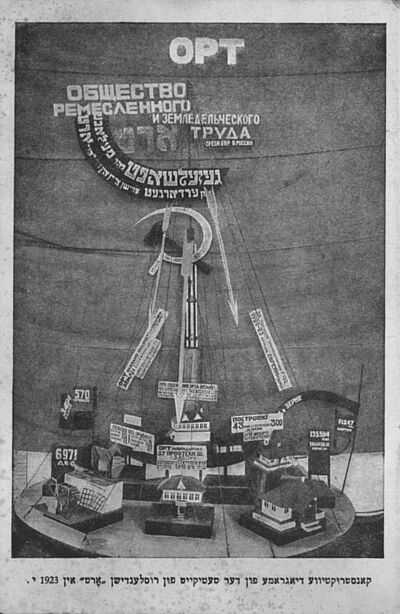ORT in Russia
View Gallery of Photos and Document Collection
ORT was founded in St Petersburg, Tsarist Russia, in 1880 to provide employable skills for Russia’s impoverished Jewish people. A group of influential Jews obtained permission to form a “charitable fund for a useful purpose” in honour of the Tsar’s 25th anniversary. “ORT” was coined from the acronym of the Russian words “Obshestvo Remeslennogo i Zemledelcheskogo Truda ” meaning The Society for Trades and Agricultural Labour. ORT distributed funds to Jewish schools for handicraft and agricultural training and provided grants or loans to artisans and farmers.
In the 1900s the organisation began to sponsor cooperative ventures, to support training programmes in Jewish schools and to establish its own vocational schools. During and after World War I, ORT’s workshops, credit and labour offices saved thousands from starvation and unemployment. After the 1917 Russian Revolution, ORT worked with the Soviet authorities to establish and support industrial and agricultural collectives. It imported and supplied materials, machinery, farming equipment and expertise throughout the Soviet Union.
In the 1930s ORT was involved in the resettlement of Jews in the Jewish Autonomous Region in Birobidzhan. It supported several workshops and factories including cedar oil and timber-chemical plants, brickworks, a sawmill, and marble, furniture and haberdashery factories.
In 1938 ORT’s cooperation agreement with the Soviet authorities expired and was not renewed. ORT was forced to cease operations in the Soviet Union.
ORT returned to Russia in 1990 and soon opened computer laboratories in six Russian cities. In 1995 the first ORT school was inaugurated in Moscow, followed by a resource centre at a Jewish school in St Petersburg. In 1996 ORT Moscow Technology College was opened. In 1999 the first of several ORT Regeneration 2000 technology centres in the FSU opened in Samara, quickly followed by another in Kazan in 2000.
ORT Russia continues to provide technologically advanced education to attract Jewish families who, although mainly interested in ensuring a first-rate general and STEM-based education for their children, will also benefit from its schools’ Jewish education.




![Two men carrying water, Moscow [Moskva], Russian SSR, USSR [now Russia], 1920s-1930s. Archive Photograph](/fileadmin/_processed_/c/d/csm_psa0539_7fe1cd5394.jpg)
![Fitting wheels to carts in Birobidzhan, Russian SSR, USSR [now Russia], 1930s. Archive Photograph](/fileadmin/_processed_/d/2/csm_psa0350_b822bdb3d9.jpg)
![Basket weaving in Birobidzhan, Russian SSR, USSR [now Russia], 1936. Archive Photograph](/fileadmin/_processed_/0/3/csm_psa0362_1166491be0.jpg)


